Tag Archives: big data analytics
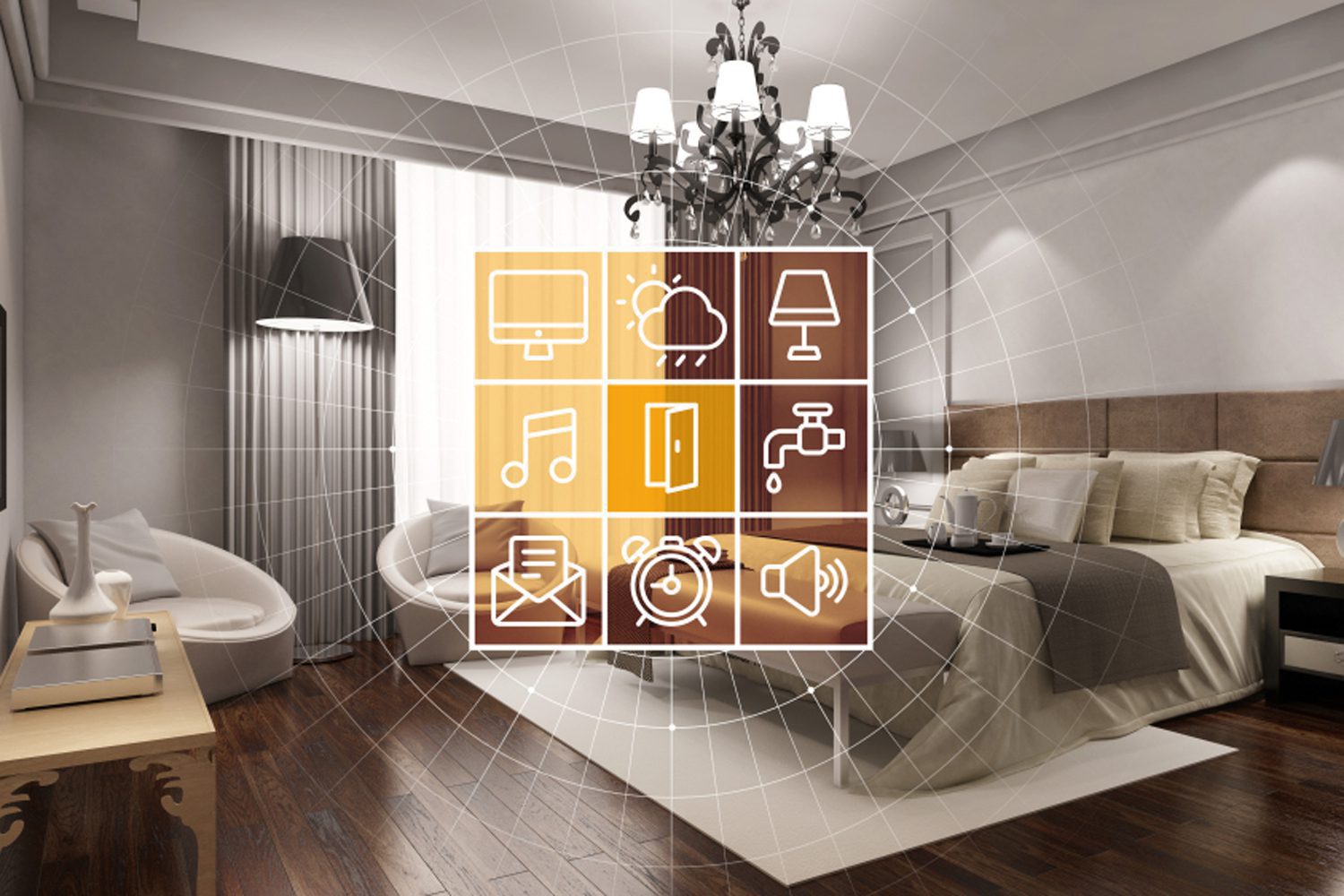
The way we work and live has been totally changed by tech. This fact applies to the hospitality sector, which has over USD 3900 billion global market size, and to the hotel sector worth over USD 570 billion.
The key to using smart tech is to redesign the guest experience and personalize your hotel’s services so that each guest feels valued. It is crucial because when you satisfy your customers, you can drive revenues.
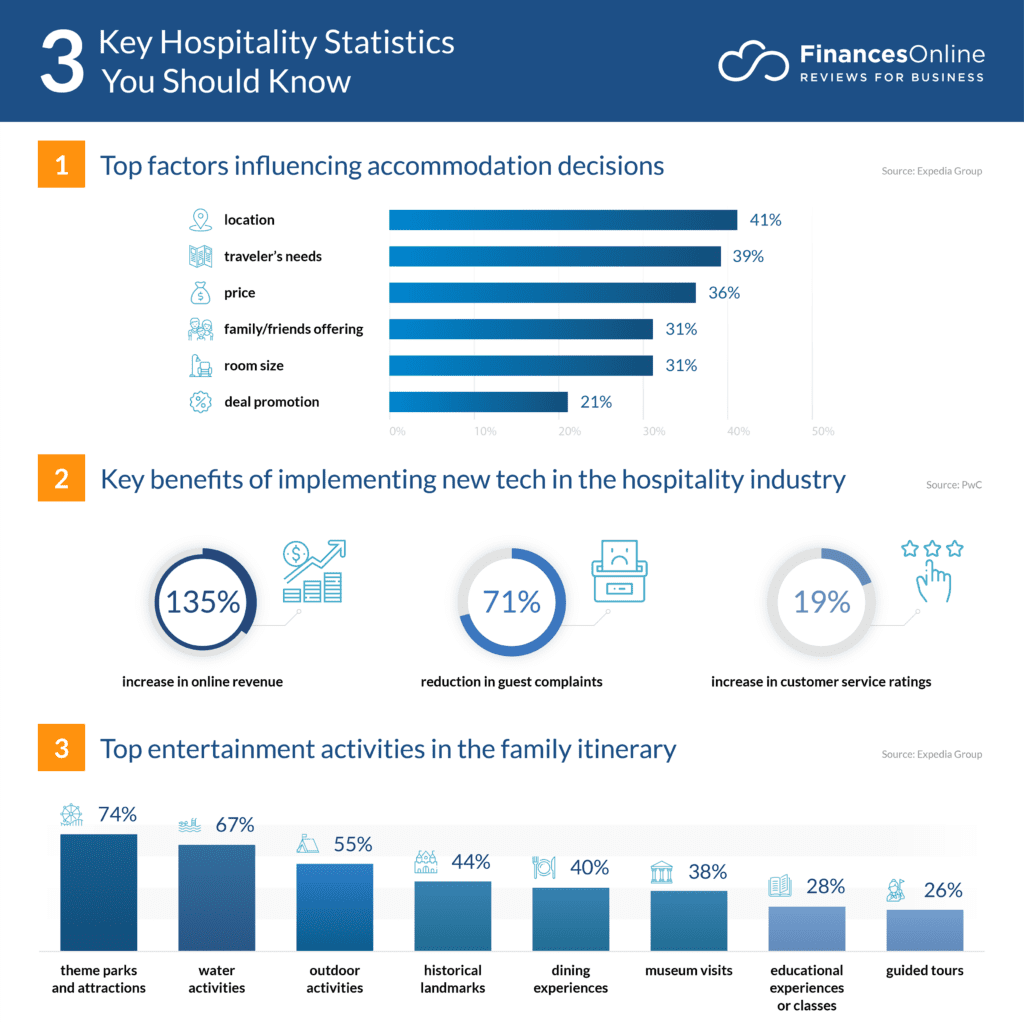
Key Benefits of Using Technologies in the Hospitality Industry
- 135% increase in online revenue
- 71% reduction in guest complaints
- 19% increase in customer service ratings
Boost Hotel Revenue by Upto 20% Today
Latest Technologies in the Hospitality Industry
Here are some ways in which technologies in the hospitality industry are helpful.
1. Hotel Revenue Management System (RMS)
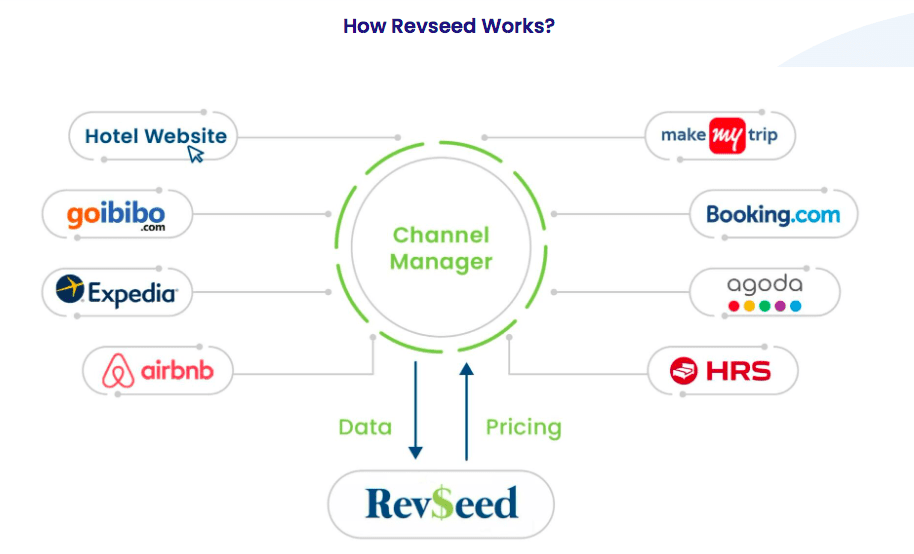


Revseed by Revnomix – best revenue management for the hospitality industry. Revnomix is one of the top hotel revenue management companies.
What is hotel Revenue Management System? A Revenue Management System is a software that analyzes prices, markets, inventory, and more to predict demand and the right price. A good RMS automates the entire process to suggest prices that can maximize revenue and profits.
The main features of a good RMS are as follows:
1. It calculates accurate prices quickly using data.
2. It provides you with revenue and profit estimates that you are likely to make through your dynamic pricing strategies.
3. It tracks revenue in real-time and provides reports.
4. It saves time and money.
5. It helps in making data-driven decisions.
Looking for the best Hotel Management Software in India or Revenue Management Services?
Revseed – The Best Revenue Management Software
2. Digital Check-in & Guestbook
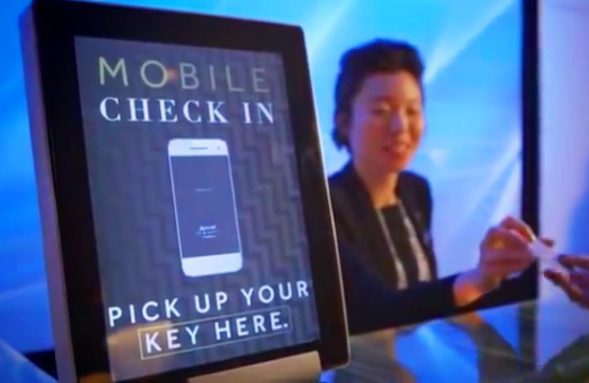


Digital check-in and check-out through smartphone.
Image credit – musafirnamah
Digital check-ins increased by 66% in response to the pandemic and are here to stay. After a long day of travel, hotel guests have adapted to the flexibility and convenience of digital check-in. Hotel staff can speed up the check-in process by pre-sending documents, taking signatures via email and SMS, and creating custom guest portals to manage guests’ data with the help of digital check-in technologies in the hospitality industry.
It can speed up the arrival and allow guests to get to their rooms faster. To avoid front desk lines, hotels have started issuing digital forms that can be pre-filled by guests on their mobiles before arriving.
Digital guest books offer guests an easy, contact-free option to printed hotel brochures by giving data about your hotel. A digital guest book’s ability to provide guests with personalized experiences is one of its key benefits.
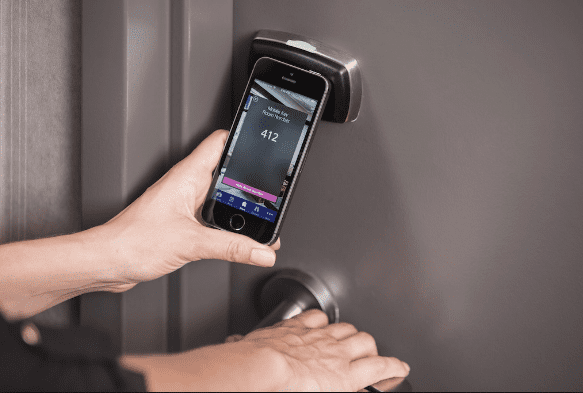


Mobile phone used as hotel room key.
Keyless entry has become popular as a result of the pandemic, and physical room keys are now a thing of the past. As per Trend Researchers, 46% of travelers use a mobile key solution which is a vital on-property feature for them. Some visitors might be worried about the security of keyless entry, but the options are encrypted, registered with the guest’s phone number, and expire as soon as the guest has checked out.
3. Automated Artificial Intelligence (AI)
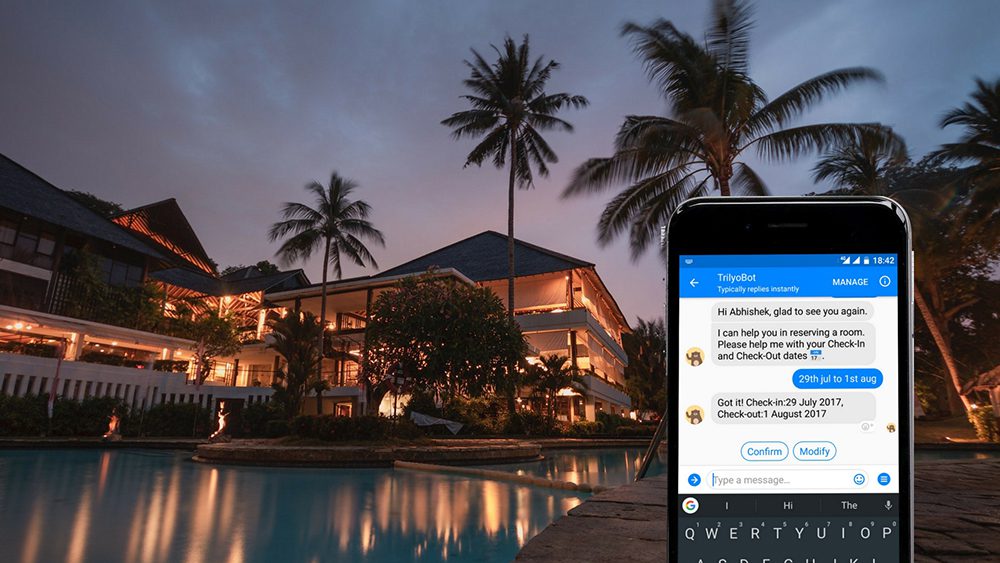


Chatbots online in hospitality industry.
Image credit – marutitech
Automated AI messages via Chatbots, SMS, and WhatsApp can help to know guest intent and suggest actions to support guests, like sending a post-stay survey or advising a late check-out. Where artificial intelligence is used? AI can help hotels without a concierge or a small front desk staff by improving the guest experience through personalized suggestions for tours and activities and acting as a central place to ask questions.
It can help free your staff’s time so they can focus on personalized service. Artificial Intelligence in India and abroad can be applied to a hotel’s website to speed up the booking process and motivate more direct bookings by talking with guests through the live chat function.
4. Big Data Analytics
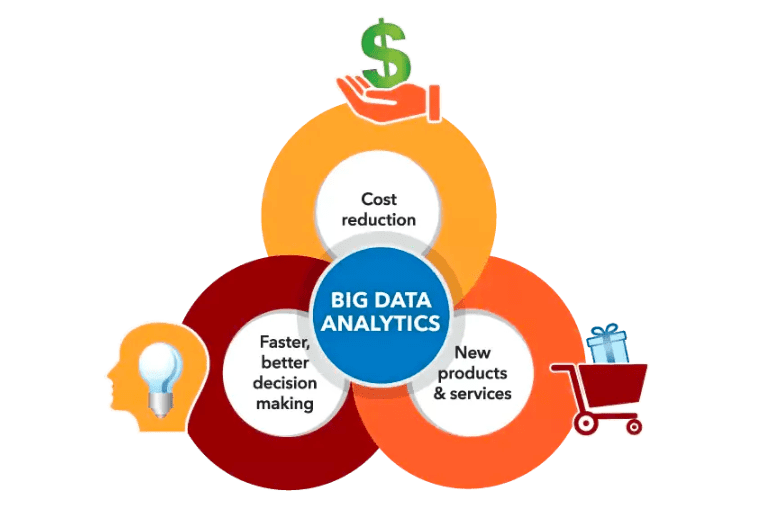


Benefits of big data analytics in the hotel industry.
Image credit – datatobiz
The most useful trends in hotel tech are data analytics and business intelligence. Big data is a broad range of data that hotels can gather from guests. After that, it is put to use to examine consumer behavior and help hotels to make data-driven decisions. Using the data, you can customize your offerings to your guests’ needs and interests and give them a personalized experience.
Also Read: Top 5 Benefits of Data Analytics for Managers & Hotel Owners
5. Cloud Hotel Property Management System (PMS)
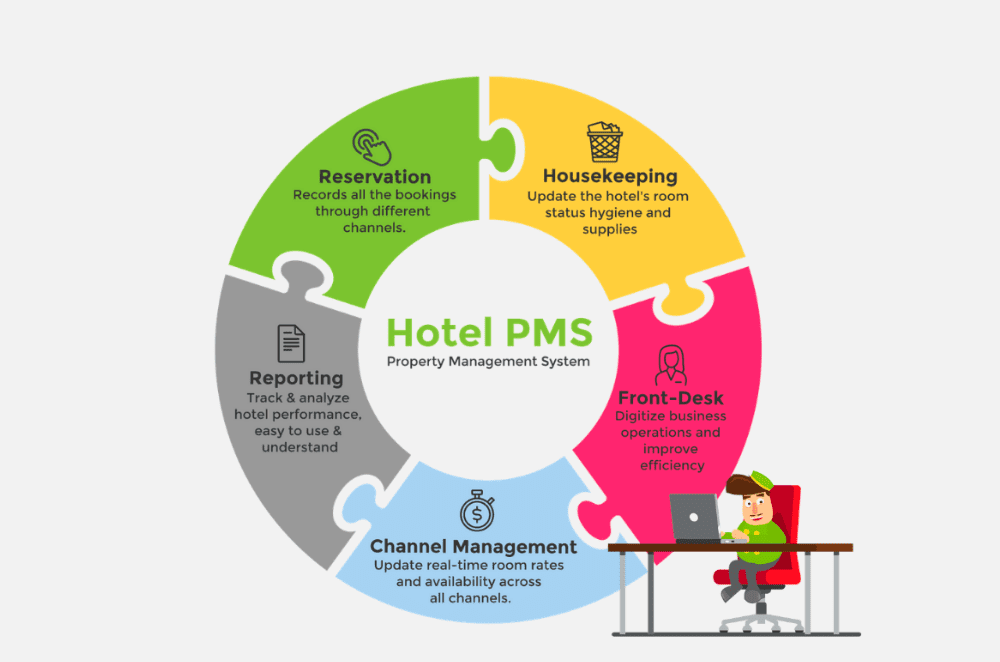


Functions of Hotel Property Management Systems.
Image credit – page.mysoftinn
A cloud-based property management system will always be useful when we talk about technologies in the hospitality industry. It has always been the backbone of a successful hotel. It is used to automate every operation of your hotel. Whether it’s the front desk, billing, or anything, you name it, a PMS takes care of everything.
A hotel property management system enables a hotel or a chain of hotels to manage day-to-day functions like bookings, guest check-in/check-out, room rates, billing, etc. In order to provide operational flexibility, hotels will need a PMS that integrates with techs like pre-arrival check-in, keyless entry, and message platforms. It improves the RevPAR and ADR (Average Daily Rate) of your hotel and provides high data security. If you want to improve the RevPAR and ADR for hotel, Revnomix is the best hotel management consulting firm.
6. Contactless Payments
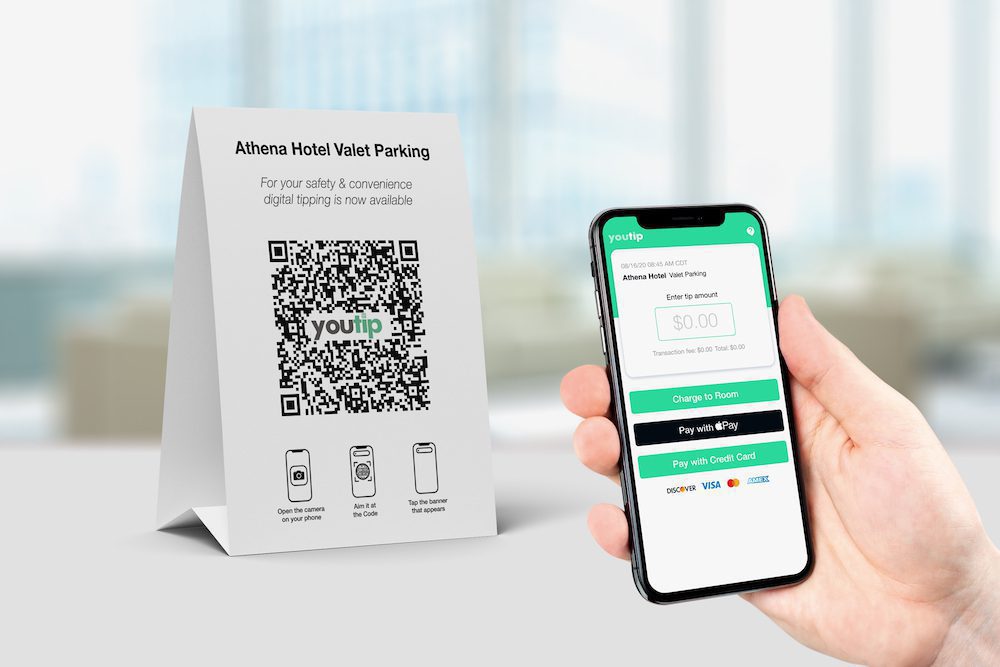


Contactless payments in hotels via QR codes.
Image credit – hotel-online
As per the US Research and Markets report, the global contactless payment market was valued at $13.23 billion USD in 2020 and is expected to reach $51.07 billion USD by 2026.
Contactless payment is one of the new technologies in the hospitality industry that every hotel owner needs to be aware of. Guests complete transactions by placing their card, or even a mobile device, close to the reader. It takes less time so visitors can check in fast and unwind after a long day of traveling.
Guests can transfer money to any account using mobile devices. UPI payments made by scanning a QR code are a great example. To keep up with changing trends, hotels must upgrade to advanced payment processing services and systems that accept many contactless and mobile payment options.
7. Internet of Things (IoT)



Smart hotel room controlled via smartphone.
Wi-Fi and sensor-based apps are used to connect objects as part of the Internet of Things. “Smart rooms” or “smart hotels” are spaces that have devices that can communicate with one another, making them smart.
Every aspect of hotel operations can benefit from IoT. IoT sensors can be installed in rooms to notify housekeeping when a guest leaves their room. Voice control can be used with in-room devices that act as a virtual concierge to give personalized suggestions. Guests can use an app on their phones to control the temperature and lighting in their rooms as well.
8. Translation Tools
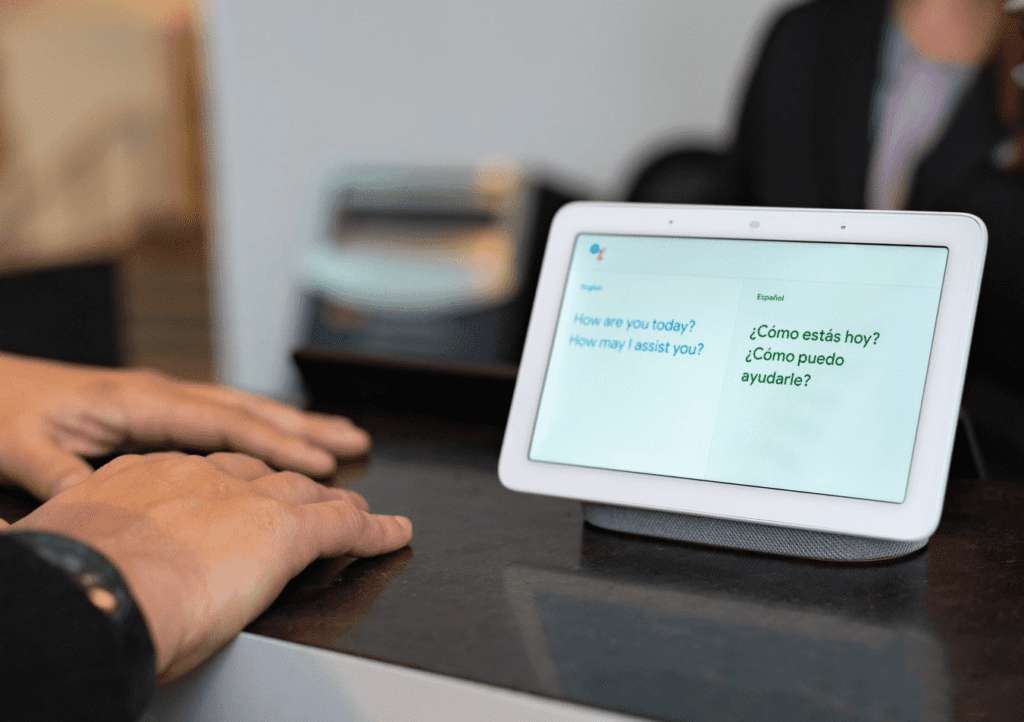


Google Assitant helps you translate over 29 languages.
Recent research found that 76% of online shoppers buy products with information in their own language. And hotels communicate with guests who speak many languages on a daily basis. It is crucial to provide good customer service and guest experience, so hotel owners must adapt this tech to overcome language barriers.
To speak with potential guests in their language, hotels use translation tech on their websites. To respond to queries and turn website visitors into guests, this tech works instantly by translating requests into the language of your choice. Translation tools can be integrated with guest services so you can speak with anyone in their own language. It is a necessity rather than a trend in the hotel industry.
9. Meta Searches
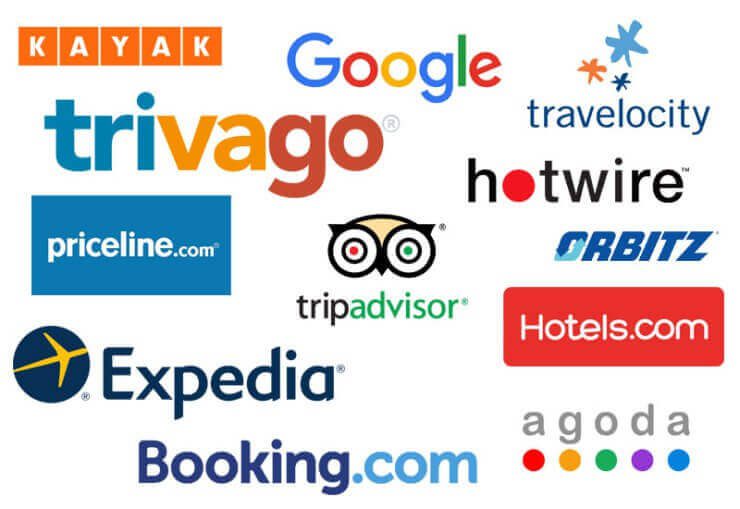


Metasearch websites for marketing of hotels.
Image credit – revenue-hub
What are metasearch engines? As more people plan their trips to save time and money, metasearch platforms have become popular. Their research is refined by metasearch engines like Google Hotel Ads, Tripadvisor, and more which compile hotel details and rates from many online sources and display them all in one location.
Hotels can boost direct bookings, diversify their product offering, and upsell and cross-sell by using metasearch marketing. With metasearch solutions, hotels can pay metasearch engines with a fee (cost-per-click) for each visitor to their website. Hotels that used Metasearch saw a 180% increase in bookings. Are you interested in a top hotel marketing company? Look no further! Click here.
10. Virtual Reality (VR) & Augmented Reality (AR)
While AR involves digital elements in the real world, virtual reality features a simulated experience in which a person can interact within an artificial setting. These techs became popular as the hotel industry looked for ways to address the impact of COVID-19. The AR market size will grow up to USD 198 billion in 2025.
In spite of the fact that guests rely more on online guest reviews, it can be difficult to view the product and service before booking a room. But through the VR headset, guests can experience a virtual tour of the hotel.
Hotels can use VR and AR to connect with new customers in a unique way. Giving guests reliable data can entice them to complete their booking. The hotel sector can improve the guest experience drastically by offering an AR menu. Here you can see how Atlantis Dubai uses VR tours to attract guests.
11. Online Streaming Services
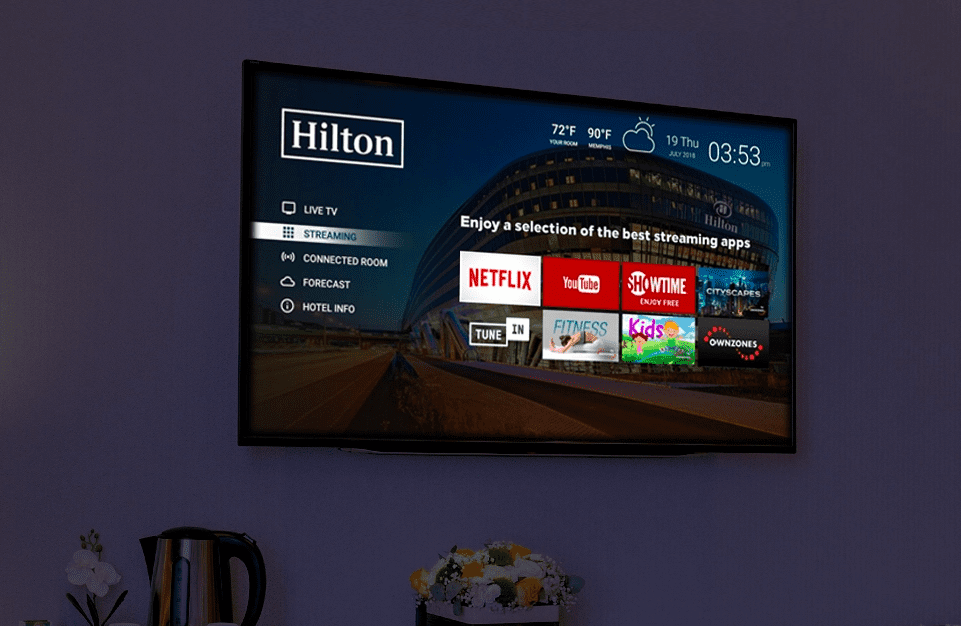


Hilton and Netflix has first-of-a-kind partnership that will give Hilton’s guests the ability to log into Netflix and control their streaming experience directly from Hilton’s own Hilton Honors mobile app.
Image credit – techcrunch
Streaming platforms are a new addition to the list of in-room technologies in the hospitality industry. Guests expect to stream content from their preferred provider from their hotel room (Disney+, Netflix, or Amazon Prime). To enhance the guest experience, hotels should move away from cable in guest rooms and toward streaming services.
Hilton guests will be able to sign in to Netflix and manage their streaming experience straight from Hilton’s own app thanks to a bold new partnership between Hilton and Netflix.
12. Sustainable Solutions
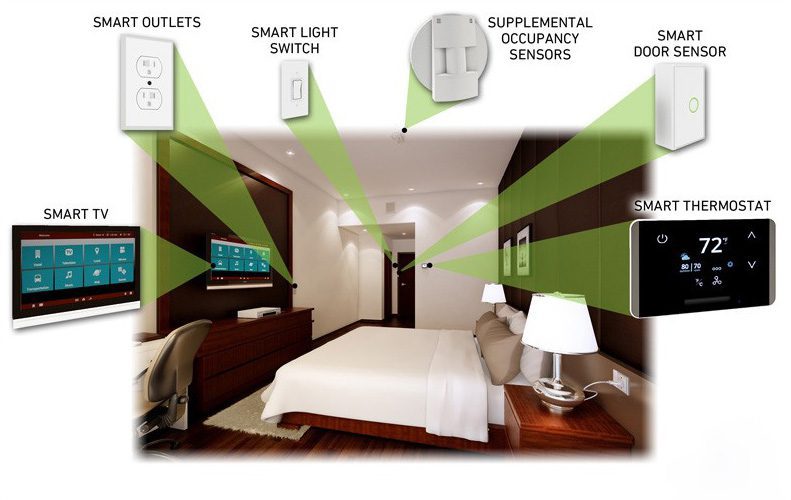


Sustainable solutions concept in a hotel room.
Image credit – base-4
As per a report by Booking.com, 83% of global travelers think that sustainable travel is vital. Both from a guest and hotel point of view, sustainability is essential.You can save a lot of money by using smart technologies in the hospitality industry like energy-saving devices or occupancy sensors.
These sensors are great at cutting down on energy costs. These sensors can take the form of thermal sensors or motion detectors. These sensors have the ability to auto-turn off the power in hotel rooms when nobody is present, so you don’t pay extra costs.
Hotels can save a lot of money by updating their lighting and bringing water-saving tools. Money can be saved as well by switching to low-flow faucets and shower heads without giving up the desired water pressure, as water usage is another major operating expense.
13. Robots
Robots can be used for many contactless services. When guests arrive, robots can be used to welcome them and give them vital information. Some hotels have gotten very creative with this, like this robot-staffed hotel in Japan.
Room service and housekeeping services can also be provided by robots. Robots can help provide contactless service that puts customers at ease in a society where social distance is still a major factor.
“If the only way you are adding value as a revenue manager is through pricing strategy, you’ll be obsolete in five years,” says Mike Medsker, co-founder of Focal Revenue Solutions. “The robots are coming, and they are pretty good at crunching numbers and updating prices.
“However,” he continued, “those that see this as an opportunity rather than a threat understand that by outsourcing the more mundane revenue management tasks to technology, they can free up their time for determining strategy, building culture, and implementing the holistic changes that will build long-term value for the hotels under their care.”
14. Face Recognition
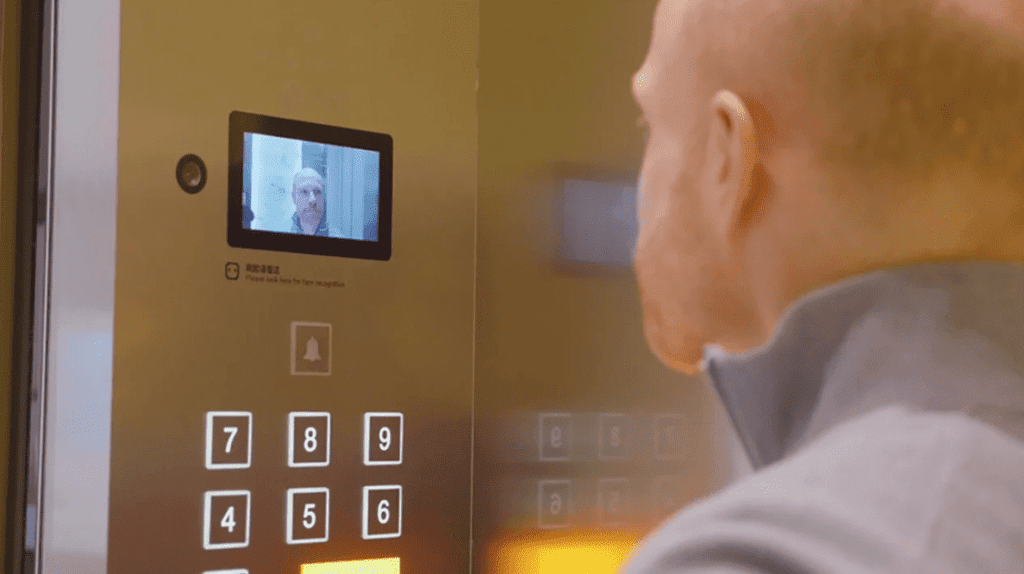


Alibaba’s FlyZoo hotel in China uses face recognition tech.
Image credit – Alizila/Alibaba
It is a type of biometric tech called face recognition that can identify people by the features on their faces. If you have an Apple or Android phone that is more recent, you’re probably already familiar with it.
It provides security and better in the hospitality industry and tourism. It can be used by hotels to allow guests access to their rooms and block access to anyone as well. With the aid of this tech, staff members can recognize a special guest, such as a regular spender or a loyal customer, and provide them with special attention.
How Technologies in the Hospitality Industry has changed Revenue Management over time?
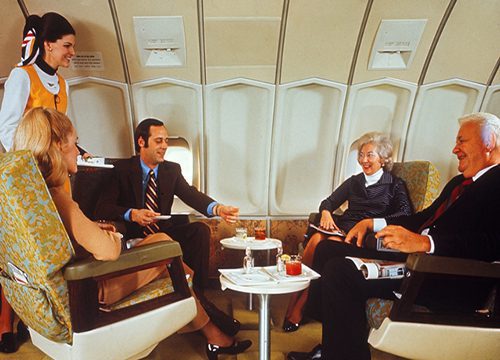


Delta 747 Penthouse – a unique first-class experience in the 1970s.
Image credit – deltamuseum
The revenue management concept is not new in the hospitality sector. Airlines in the US have been using it since the 1970s. Delta Airlines had about 150 pricing-related staff roles by the 1980s.
The use of AI, VR, and more technologies in the hospitality industry has expanded the reach of hotel owners and helped them in a number of ways. As they can access the revenue management hotel system whenever they want and from any location using their phone, tablet, or desktop, hotel owners now feel more connected to their staff across all departments.
When we pay close attention, we can see how customer expectations are at an all-time high. When guests make hotel bookings, they hope for a great experience, which may seem difficult to achieve for many hotels.
Things will be easy if hotel owners use new tech and integrate it with their hotel operations. The use of smart tech in hotels can equip them with the tools they need to provide unique and personalized customer service, which can help hotels draw in guests, keep them there longer and boost revenue.
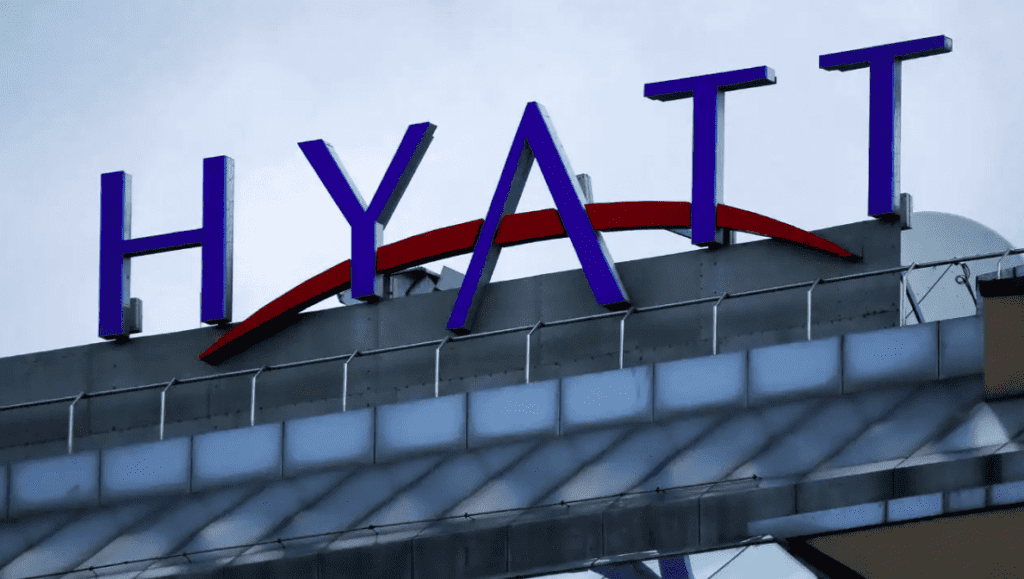


Hyatt Hotels Corp. plans to deploy IDeaS’s suite of hospitality revenue optimization software and services globally.
Image credit – moneycontrol
Many famous hotels like Hyatt, Radisson, and more have realized the benefits of tech and are using a good RMS, which enables them to make the most of their staff and services to enhance the guest experience. Boost hotel revenue with Revnomix – one of the top revenue management companies in India.
Case Studies of Hotels Using Revenue Management Strategies
How Technologies in the Hospitality Industry Can Help After COVID-19?
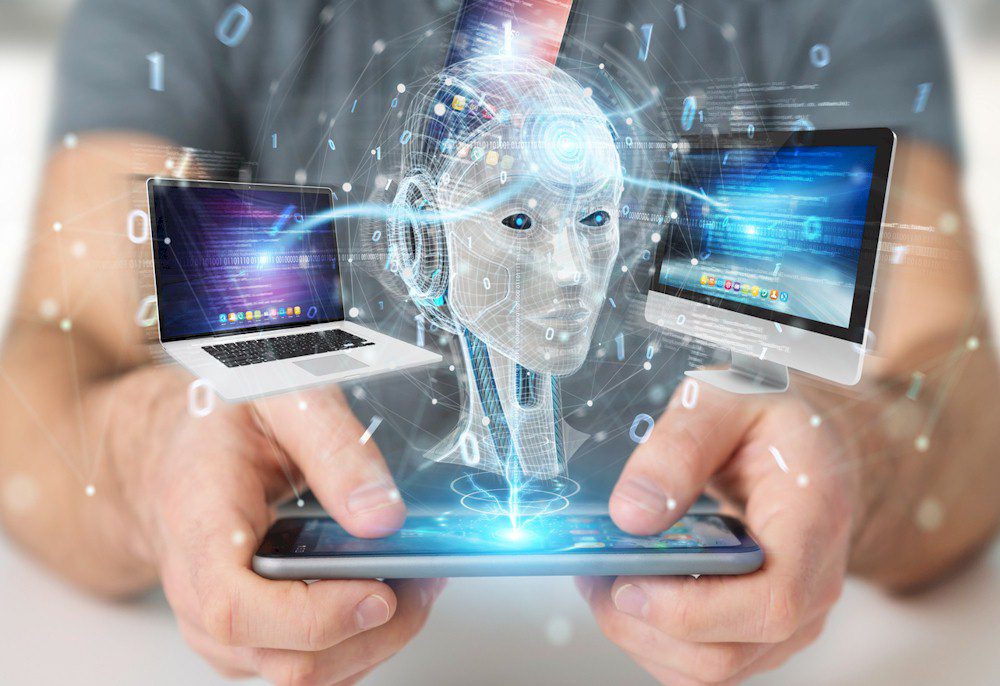


AI technologies in the hospitality industry will help boost revenue.
Image credit – amgrade
As the situation after COVID-19 evolves, the main need for all hotels has been the well-being of their staff and clients. The hotels are zeroing in on phases of action to be made after COVID-19.
The first step is to examine the current situation to protect your staff, clients, and the hotel. The second step is to focus on the hotel so that you can evaluate the disruption and plan for recovery. Finally, the most crucial step comes when you make changes to adapt to the post-COVID situation.
Plan for the Next Normal
Hotels are working actively to balance their revenue and identify new opportunities to get ready for the post-COVID stage. Hotels can put in a couple of hours to think ahead or can assign a group of experts to make total revenue management plans for 2022. Hotels need to focus on their customers if they want to succeed in the next normal and apply a successful revenue management strategy.
Navigate the Disruption
COVID-19 has influenced hotels in different manners through changes in customer conduct like channel choice, customer trips, use of media, and more. This shift in customer conduct with a high degree of risk around the size and term of changes requires quick planning.
More Inter-Departmental Partnerships
Tracking TRevPAR (total revenue per available room), as well as RevPAR (Revenue per available room), will help. This means that experts should look all the more carefully at revenue created in departments other than rooms.
This change could prompt revenue experts to move from the basic part of overseeing frameworks and data to taking a more vital part in hotel dynamics across divisions. Tech trends like AI, VR, RMS, and more will help to increase revenue. Do you want best hotel consultants in India?
Also Read: Benefits of Outsourcing Hotel Revenue Management Services in 2022
Future of Technologies in the Hospitality Industry
After the COVID-19 pandemic, the hospitality sector cannot expect a speedy return to normal. Today travelers require more contactless support and risk-free travel. If hotels are going to keep up, technologies in the hospitality industry will be paramount.
It’s a whole new world for hospitality players with VR tours, chatbots, in-room IoT, and more. But it’s up to the hotels to stay in the game by embracing modern tech and RMS business with open arms. Still searching for the best hotel management software and consultants? Contact Revnomix – the best revenue management company in India.


The way we work and live has been totally changed by tech. This fact applies to the hospitality sector, which has over USD 3900 billion global market size, and to the hotel sector worth over USD 570 billion.
The key to using smart tech is to redesign the guest experience and personalize your hotel’s services so that each guest feels valued. It is crucial because when you satisfy your customers, you can drive revenues.



Key Benefits of Using Technologies in the Hospitality Industry
- 135% increase in online revenue
- 71% reduction in guest complaints
- 19% increase in customer service ratings
Boost Hotel Revenue by Upto 20% Today
Latest Technologies in the Hospitality Industry
Here are some ways in which technologies in the hospitality industry are helpful.
1. Hotel Revenue Management System (RMS)



Revseed by Revnomix – best revenue management for the hospitality industry. Revnomix is one of the top hotel revenue management companies.
What is hotel Revenue Management System? A Revenue Management System is a software that analyzes prices, markets, inventory, and more to predict demand and the right price. A good RMS automates the entire process to suggest prices that can maximize revenue and profits.
The main features of a good RMS are as follows:
1. It calculates accurate prices quickly using data.
2. It provides you with revenue and profit estimates that you are likely to make through your dynamic pricing strategies.
3. It tracks revenue in real-time and provides reports.
4. It saves time and money.
5. It helps in making data-driven decisions.
Looking for the best Hotel Management Software in India or Revenue Management Services?
Revseed – The Best Revenue Management Software
2. Digital Check-in & Guestbook



Digital check-in and check-out through smartphone.
Image credit – musafirnamah
Digital check-ins increased by 66% in response to the pandemic and are here to stay. After a long day of travel, hotel guests have adapted to the flexibility and convenience of digital check-in. Hotel staff can speed up the check-in process by pre-sending documents, taking signatures via email and SMS, and creating custom guest portals to manage guests’ data with the help of digital check-in technologies in the hospitality industry.
It can speed up the arrival and allow guests to get to their rooms faster. To avoid front desk lines, hotels have started issuing digital forms that can be pre-filled by guests on their mobiles before arriving.
Digital guest books offer guests an easy, contact-free option to printed hotel brochures by giving data about your hotel. A digital guest book’s ability to provide guests with personalized experiences is one of its key benefits.



Mobile phone used as hotel room key.
Keyless entry has become popular as a result of the pandemic, and physical room keys are now a thing of the past. As per Trend Researchers, 46% of travelers use a mobile key solution which is a vital on-property feature for them. Some visitors might be worried about the security of keyless entry, but the options are encrypted, registered with the guest’s phone number, and expire as soon as the guest has checked out.
3. Automated Artificial Intelligence (AI)



Chatbots online in hospitality industry.
Image credit – marutitech
Automated AI messages via Chatbots, SMS, and WhatsApp can help to know guest intent and suggest actions to support guests, like sending a post-stay survey or advising a late check-out. Where artificial intelligence is used? AI can help hotels without a concierge or a small front desk staff by improving the guest experience through personalized suggestions for tours and activities and acting as a central place to ask questions.
It can help free your staff’s time so they can focus on personalized service. Artificial Intelligence in India and abroad can be applied to a hotel’s website to speed up the booking process and motivate more direct bookings by talking with guests through the live chat function.
4. Big Data Analytics



Benefits of big data analytics in the hotel industry.
Image credit – datatobiz
The most useful trends in hotel tech are data analytics and business intelligence. Big data is a broad range of data that hotels can gather from guests. After that, it is put to use to examine consumer behavior and help hotels to make data-driven decisions. Using the data, you can customize your offerings to your guests’ needs and interests and give them a personalized experience.
Also Read: Top 5 Benefits of Data Analytics for Managers & Hotel Owners
5. Cloud Hotel Property Management System (PMS)



Functions of Hotel Property Management Systems.
Image credit – page.mysoftinn
A cloud-based property management system will always be useful when we talk about technologies in the hospitality industry. It has always been the backbone of a successful hotel. It is used to automate every operation of your hotel. Whether it’s the front desk, billing, or anything, you name it, a PMS takes care of everything.
A hotel property management system enables a hotel or a chain of hotels to manage day-to-day functions like bookings, guest check-in/check-out, room rates, billing, etc. In order to provide operational flexibility, hotels will need a PMS that integrates with techs like pre-arrival check-in, keyless entry, and message platforms. It improves the RevPAR and ADR (Average Daily Rate) of your hotel and provides high data security. If you want to improve the RevPAR and ADR for hotel, Revnomix is the best hotel management consulting firm.
6. Contactless Payments



Contactless payments in hotels via QR codes.
Image credit – hotel-online
As per the US Research and Markets report, the global contactless payment market was valued at $13.23 billion USD in 2020 and is expected to reach $51.07 billion USD by 2026.
Contactless payment is one of the new technologies in the hospitality industry that every hotel owner needs to be aware of. Guests complete transactions by placing their card, or even a mobile device, close to the reader. It takes less time so visitors can check in fast and unwind after a long day of traveling.
Guests can transfer money to any account using mobile devices. UPI payments made by scanning a QR code are a great example. To keep up with changing trends, hotels must upgrade to advanced payment processing services and systems that accept many contactless and mobile payment options.
7. Internet of Things (IoT)



Smart hotel room controlled via smartphone.
Wi-Fi and sensor-based apps are used to connect objects as part of the Internet of Things. “Smart rooms” or “smart hotels” are spaces that have devices that can communicate with one another, making them smart.
Every aspect of hotel operations can benefit from IoT. IoT sensors can be installed in rooms to notify housekeeping when a guest leaves their room. Voice control can be used with in-room devices that act as a virtual concierge to give personalized suggestions. Guests can use an app on their phones to control the temperature and lighting in their rooms as well.
8. Translation Tools



Google Assitant helps you translate over 29 languages.
Recent research found that 76% of online shoppers buy products with information in their own language. And hotels communicate with guests who speak many languages on a daily basis. It is crucial to provide good customer service and guest experience, so hotel owners must adapt this tech to overcome language barriers.
To speak with potential guests in their language, hotels use translation tech on their websites. To respond to queries and turn website visitors into guests, this tech works instantly by translating requests into the language of your choice. Translation tools can be integrated with guest services so you can speak with anyone in their own language. It is a necessity rather than a trend in the hotel industry.
9. Meta Searches



Metasearch websites for marketing of hotels.
Image credit – revenue-hub
What are metasearch engines? As more people plan their trips to save time and money, metasearch platforms have become popular. Their research is refined by metasearch engines like Google Hotel Ads, Tripadvisor, and more which compile hotel details and rates from many online sources and display them all in one location.
Hotels can boost direct bookings, diversify their product offering, and upsell and cross-sell by using metasearch marketing. With metasearch solutions, hotels can pay metasearch engines with a fee (cost-per-click) for each visitor to their website. Hotels that used Metasearch saw a 180% increase in bookings. Are you interested in a top hotel marketing company? Look no further! Click here.
10. Virtual Reality (VR) & Augmented Reality (AR)
While AR involves digital elements in the real world, virtual reality features a simulated experience in which a person can interact within an artificial setting. These techs became popular as the hotel industry looked for ways to address the impact of COVID-19. The AR market size will grow up to USD 198 billion in 2025.
In spite of the fact that guests rely more on online guest reviews, it can be difficult to view the product and service before booking a room. But through the VR headset, guests can experience a virtual tour of the hotel.
Hotels can use VR and AR to connect with new customers in a unique way. Giving guests reliable data can entice them to complete their booking. The hotel sector can improve the guest experience drastically by offering an AR menu. Here you can see how Atlantis Dubai uses VR tours to attract guests.
11. Online Streaming Services



Hilton and Netflix has first-of-a-kind partnership that will give Hilton’s guests the ability to log into Netflix and control their streaming experience directly from Hilton’s own Hilton Honors mobile app.
Image credit – techcrunch
Streaming platforms are a new addition to the list of in-room technologies in the hospitality industry. Guests expect to stream content from their preferred provider from their hotel room (Disney+, Netflix, or Amazon Prime). To enhance the guest experience, hotels should move away from cable in guest rooms and toward streaming services.
Hilton guests will be able to sign in to Netflix and manage their streaming experience straight from Hilton’s own app thanks to a bold new partnership between Hilton and Netflix.
12. Sustainable Solutions



Sustainable solutions concept in a hotel room.
Image credit – base-4
As per a report by Booking.com, 83% of global travelers think that sustainable travel is vital. Both from a guest and hotel point of view, sustainability is essential.You can save a lot of money by using smart technologies in the hospitality industry like energy-saving devices or occupancy sensors.
These sensors are great at cutting down on energy costs. These sensors can take the form of thermal sensors or motion detectors. These sensors have the ability to auto-turn off the power in hotel rooms when nobody is present, so you don’t pay extra costs.
Hotels can save a lot of money by updating their lighting and bringing water-saving tools. Money can be saved as well by switching to low-flow faucets and shower heads without giving up the desired water pressure, as water usage is another major operating expense.
13. Robots
Robots can be used for many contactless services. When guests arrive, robots can be used to welcome them and give them vital information. Some hotels have gotten very creative with this, like this robot-staffed hotel in Japan.
Room service and housekeeping services can also be provided by robots. Robots can help provide contactless service that puts customers at ease in a society where social distance is still a major factor.
“If the only way you are adding value as a revenue manager is through pricing strategy, you’ll be obsolete in five years,” says Mike Medsker, co-founder of Focal Revenue Solutions. “The robots are coming, and they are pretty good at crunching numbers and updating prices.
“However,” he continued, “those that see this as an opportunity rather than a threat understand that by outsourcing the more mundane revenue management tasks to technology, they can free up their time for determining strategy, building culture, and implementing the holistic changes that will build long-term value for the hotels under their care.”
14. Face Recognition



Alibaba’s FlyZoo hotel in China uses face recognition tech.
Image credit – Alizila/Alibaba
It is a type of biometric tech called face recognition that can identify people by the features on their faces. If you have an Apple or Android phone that is more recent, you’re probably already familiar with it.
It provides security and better in the hospitality industry and tourism. It can be used by hotels to allow guests access to their rooms and block access to anyone as well. With the aid of this tech, staff members can recognize a special guest, such as a regular spender or a loyal customer, and provide them with special attention.
How Technologies in the Hospitality Industry has changed Revenue Management over time?



Delta 747 Penthouse – a unique first-class experience in the 1970s.
Image credit – deltamuseum
The revenue management concept is not new in the hospitality sector. Airlines in the US have been using it since the 1970s. Delta Airlines had about 150 pricing-related staff roles by the 1980s.
The use of AI, VR, and more technologies in the hospitality industry has expanded the reach of hotel owners and helped them in a number of ways. As they can access the revenue management hotel system whenever they want and from any location using their phone, tablet, or desktop, hotel owners now feel more connected to their staff across all departments.
When we pay close attention, we can see how customer expectations are at an all-time high. When guests make hotel bookings, they hope for a great experience, which may seem difficult to achieve for many hotels.
Things will be easy if hotel owners use new tech and integrate it with their hotel operations. The use of smart tech in hotels can equip them with the tools they need to provide unique and personalized customer service, which can help hotels draw in guests, keep them there longer and boost revenue.



Hyatt Hotels Corp. plans to deploy IDeaS’s suite of hospitality revenue optimization software and services globally.
Image credit – moneycontrol
Many famous hotels like Hyatt, Radisson, and more have realized the benefits of tech and are using a good RMS, which enables them to make the most of their staff and services to enhance the guest experience. Boost hotel revenue with Revnomix – one of the top revenue management companies in India.
Case Studies of Hotels Using Revenue Management Strategies
How Technologies in the Hospitality Industry Can Help After COVID-19?



AI technologies in the hospitality industry will help boost revenue.
Image credit – amgrade
As the situation after COVID-19 evolves, the main need for all hotels has been the well-being of their staff and clients. The hotels are zeroing in on phases of action to be made after COVID-19.
The first step is to examine the current situation to protect your staff, clients, and the hotel. The second step is to focus on the hotel so that you can evaluate the disruption and plan for recovery. Finally, the most crucial step comes when you make changes to adapt to the post-COVID situation.
Plan for the Next Normal
Hotels are working actively to balance their revenue and identify new opportunities to get ready for the post-COVID stage. Hotels can put in a couple of hours to think ahead or can assign a group of experts to make total revenue management plans for 2022. Hotels need to focus on their customers if they want to succeed in the next normal and apply a successful revenue management strategy.
Navigate the Disruption
COVID-19 has influenced hotels in different manners through changes in customer conduct like channel choice, customer trips, use of media, and more. This shift in customer conduct with a high degree of risk around the size and term of changes requires quick planning.
More Inter-Departmental Partnerships
Tracking TRevPAR (total revenue per available room), as well as RevPAR (Revenue per available room), will help. This means that experts should look all the more carefully at revenue created in departments other than rooms.
This change could prompt revenue experts to move from the basic part of overseeing frameworks and data to taking a more vital part in hotel dynamics across divisions. Tech trends like AI, VR, RMS, and more will help to increase revenue. Do you want best hotel consultants in India?
Also Read: Benefits of Outsourcing Hotel Revenue Management Services in 2022
Future of Technologies in the Hospitality Industry
After the COVID-19 pandemic, the hospitality sector cannot expect a speedy return to normal. Today travelers require more contactless support and risk-free travel. If hotels are going to keep up, technologies in the hospitality industry will be paramount.
It’s a whole new world for hospitality players with VR tours, chatbots, in-room IoT, and more. But it’s up to the hotels to stay in the game by embracing modern tech and RMS business with open arms. Still searching for the best hotel management software and consultants? Contact Revnomix – the best revenue management company in India.